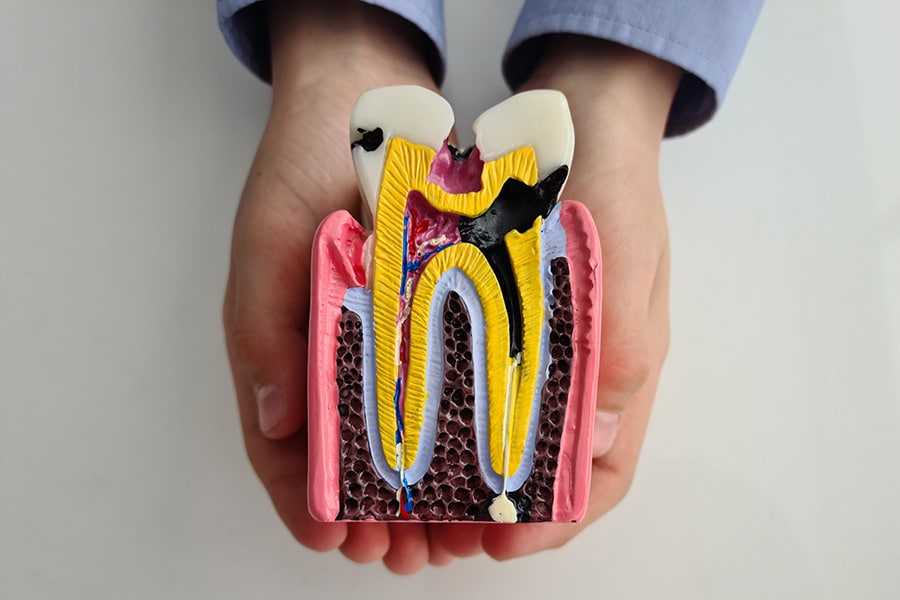Once a tooth becomes infected, it’s important to get a root canal as soon as possible to prevent further damage. If left untreated, affected teeth might become exceedingly painful or you may require a tooth extraction.
Here are the symptoms to look out for to determine if you need a root canal.
What is a Root Canal?
Root canals are dental procedures done to clean and seal teeth that have become inflamed or have infected pulp. The pulp of a tooth is the soft tissue area underneath the dental crown, which is made up of the enamel and dentin of the tooth. It contains the blood vessels and nerves of the tooth.
When the pulp of a tooth becomes infected, it can cause severe pain that can eventually spread to other teeth. In these instances, a root canal becomes necessary.
To prevent the infection from spreading, the infected pulp is removed by a dentist and replaced with a sealant. A root canal also prevents or stops any tooth pain you might be experiencing from the pulp infection or damage. The root canal procedure typically lasts between 30 minutes to an hour, but the process could take longer in some cases. After your root canal, your tooth will continue to function as normal.
Most Common Root Canal Symptoms
Most patients don’t realize that their tooth is infected. It is usually impossible to see that a tooth is infected from the outside. To know if you are in need of a root canal, you’ll want to be aware of the symptoms.
1. Severe Toothache, Especially When Chewing or Biting
One of the most common symptoms to indicate a root canal treatment is needed is a severe toothache. Infected teeth often become painful, especially when eating. Biting will put pressure on the infected area, which can cause radiating pain.
This pain does not necessarily need to be in a localized area. It can also spread to other parts of your jaw or face. When a root canal is needed, this pain will often come and go, but last for a substantial amount of time.
2. Extreme Sensitivity to Hot and Cold Temperature
Feeling tooth sensitivity to heat and cold temperatures is not necessarily a cause for concern. However, if you experience any unusually severe sensitivity to hot or cold temperatures, you might have an underlying tooth issue. For patients needing a root canal, this feeling is usually a consistent and prolonged sensitivity.
3. Tooth Discoloration With Your Tooth Becoming Darker
Tooth discoloration can happen over time, and is not always a sign of poor dental health. Consuming wine or coffee can often stain your teeth without causing dental problems.
However, a tooth that becomes darker than the surrounding teeth is often an indication of a dying dental pulp. This will need to be removed through a root canal. Typically, this looks a blackish-gray color and is accompanied by frequent pain.
4. Pimple-Like Sores on Your Gums
Gum pimples are another indication of infection. They can appear on your gums and cause discomfort, an unpleasant taste, or bad breath.
5. Tender and Swollen Gums
Damaged teeth can also cause tender and swollen gums. If you experience any gum swelling, you’ll want to consult a dentist to identify the issue. Swelling can also spread to other areas of your face or neck.
6. Chipped or Cracked Teeth
Inflamed or infected teeth can also crack or chip. If you notice any cracks in your teeth, you’ll want to consult a dentist right away. A chipped or cracked tooth can be a cause of several dental issues, but this can cause pain or discomfort if left untreated.
7. Loose Tooth
An infected tooth can soften the jawbone that supports the tooth, which can make a tooth appear looser than normal. Tell your dentist right away if you think you have a loose permanent tooth.
When is a Root Canal Needed?
Root canals are typically caused by infection from an untreated cavity or external damage, like a crack or a chip. The procedure needs to be performed to prevent infection from spreading and to ease any pain the patient is experiencing.
The idea of a root canal can seem daunting to some people. But, it doesn’t have to be frightening. Millions of people receive root canals every year, saving infected teeth to restore dental health and produce a healthier smile.
Many patients are worried that a root canal procedure will be painful. In actuality, most patients feel immediate relief after the infected tissue is removed.
Root canals are considered both a safe and relatively simple procedure. While you won’t experience any significant pain after the root canal, you might have some temporary sensitivity. Any side effects from your root canal will lessen by about one week after the procedure.
If you think you might need a root canal call East Valley Dental Professionals at 480-838-3033.

